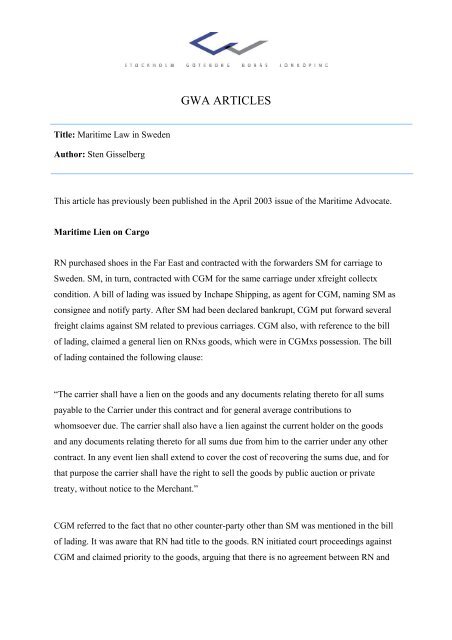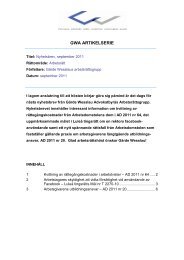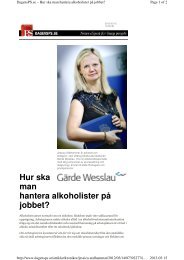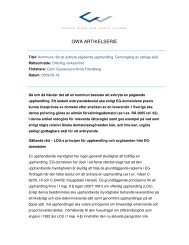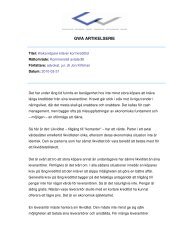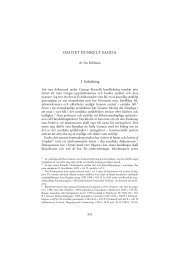You also want an ePaper? Increase the reach of your titles
YUMPU automatically turns print PDFs into web optimized ePapers that Google loves.
Title: Maritime Law in Sweden<br />
Author: Sten Gisselberg<br />
GWA ARTICLES<br />
This article has previously been published in the April 2003 issue of the Maritime Advocate.<br />
Maritime Lien on Cargo<br />
RN purchased shoes in the Far East and contracted with the forwarders SM for carriage to<br />
Sweden. SM, in turn, contracted with CGM for the same carriage under xfreight collectx<br />
condition. A bill of lading was issued by Inchape Shipping, as agent for CGM, naming SM as<br />
consignee and notify party. After SM had been declared bankrupt, CGM put forward several<br />
freight claims against SM related to previous carriages. CGM also, with reference to the bill<br />
of lading, claimed a general lien on RNxs goods, which were in CGMxs possession. The bill<br />
of lading contained the following clause:<br />
“The carrier shall have a lien on the goods and any documents relating thereto for all sums<br />
payable to the Carrier under this contract and for general average contributions to<br />
whomsoever due. The carrier shall also have a lien against the current holder on the goods<br />
and any documents relating thereto for all sums due from him to the carrier under any other<br />
contract. In any event lien shall extend to cover the cost of recovering the sums due, and for<br />
that purpose the carrier shall have the right to sell the goods by public auction or private<br />
treaty, without notice to the Merchant.”<br />
CGM referred to the fact that no other counter-party other than SM was mentioned in the bill<br />
of lading. It was aware that RN had title to the goods. RN initiated court proceedings against<br />
CGM and claimed priority to the goods, arguing that there is no agreement between RN and
CGM entitling the latter to a lien on RNxs goods. Furthermore, RN did not agree that SM<br />
could create a general lien on the goods for the benefit of CGM. AS CGM was aware that RN<br />
was the owner of the goods, CGM was not in good faith about the ownership. The District<br />
Court of Gothenburg found that CGM had a lien on the goods for all claims that it might have<br />
against SM as holder of the bill of lading, irrespective of the ownership to the goods.<br />
The Court of Appeal found that the lien clause in the bill of lading was more favourable for<br />
the carrier than the statutory right of lien stated in the Swedish Maritime Code, as it includes<br />
claims related to any contract between SM and CGM. However, CGM had not proved that<br />
SM was entitled to agree a lien on the goods for claims not connected with the actual carriage.<br />
A lien on goods against parties other than the owner was only possible when the carrier was<br />
in good faith about the ownership or when the owner had authorised a third party to charge<br />
the goods with a lien. As none of those prerequisites exist, CGMxs claim for lien on the goods<br />
was dismissed. The Court of Appeal therefore reversed the judgment of the District Court<br />
(Nordiske Domme i Sjöfartsanliggender, ND 1999 p. 5).<br />
Prorogation Clause<br />
Preem shipped gasoline with ELENA LUX under a quantity contract entered into with<br />
Herning Shipping, who had time-chartered the vessel. The consignment was partly<br />
contaminated during loading. Instead of a charter party, a tanker waybill was issued and<br />
signed by the master after the damaged cargo had been discharged, therefore covering only<br />
the shipped part of the cargo. The use of a tanker waybill was in accordance with the practice<br />
between the parties and it contained a prorogation clause referring to the District Court of<br />
Gothenburg.<br />
Preem started legal proceedings in the District Court of Gothenburg claiming compensation<br />
for the damaged cargo. Herning Shipping argued that the claim should be dismissed since no<br />
prorogation agreement in accordance with the Lugano Convention (Section 6, Article 17) had<br />
been entered into between the parties.
The Court held that the parties had agreed that the terms and conditions of the tanker waybill<br />
would apply for the entire consignment. Therefore, the prorogation clause was applicable to<br />
claims in respect of the damaged cargo as well. Herning Shippingxs claim for dismissal was<br />
rejected and the courtxs judgment was affirmed by the Court of Appeal. (Nordiske Domme i<br />
Sjöfartsanliggender, ND 1999 p. 1).<br />
Delivery duty against presentation of a bill of lading<br />
Schlüter bought an offset machine from the Swedish seller Maxgraf to be delivered from<br />
Malaysia. The machine was resold from Schlüter to Mariniko Press in Greece. Schlüter<br />
contracted with SPT Scanway Project Transport AB (SPT) on October 9 for carriage of the<br />
machine from Penang, Malaysia to Pireaus, Greece. SPT undertook to deliver the machine in<br />
Pireaus on 7 November.<br />
A bill of lading was issued by SPT indicating Schlüter as shipper, Alpha Credit Bank AE<br />
Athens as consignee and Alpha Leasing AE as notify party. SPT, in turn, hired Huyndai<br />
Merchant Marine Co Ltd (Huyndai) as sub-carrier. SPT instructed Huyndai to issue a bill of<br />
lading identifying SPT as shipper and Medtrans Ltd (Huyndaixs agent) as consignees.<br />
However, in the bill of lading, the Malyasian company Votra SDN was indicated as shipper<br />
and Maxgraf as consignees. Contrary to SPTxs instructions, Huyndai did not forward the bill<br />
of lading to SPT.<br />
The cargo arrived in Pireaus on November 7, but was not delivered to Mariniko Press before<br />
December 8, when SPT finally had convinced Huyndai that Mariniko was authorized as<br />
consignee. Schlüter started legal proceedings in Sweden against SPT, claiming compensation<br />
for lawyer’s fees incurred in connection with the delay of delivery to Pireaus and the release<br />
of the goods. Schlüter claimed that SPT had agreed to deliver the machine in Pireaus on<br />
November 7and that, as the machine was not delivered on the agreed date SPT is in delay.<br />
SPT argued that Schlüter was not an authorised consignee when the bill of lading had been
transferred to Mariniko Press or its bank, Alpha Credit Bank, after payment had been made to<br />
Schlüter.<br />
According to the District Court of Gothenburg, Schlüter was entitled to compensation from<br />
SPT for the delay, irrespective of the fact that Schlüter was not named as consignee in the bill<br />
of lading issued by SPT, as Schlüter had contracted with SPT for the carriage. According to<br />
this contract SPT guaranteed delivery to the consignee on November7. (Nordiske Domme i<br />
Sjöfartsanliggender, ND 2000 p. 44).<br />
The practice of delivering different bills of lading among the parties involved in the transport<br />
of goods is not uncommon. When separate bills of lading are issued by the contracting carrier<br />
and the sub-carrier, it is important that the contracting carrier checks that he is ensured<br />
delivery also by the bill of lading issued by the sub-carrier.


